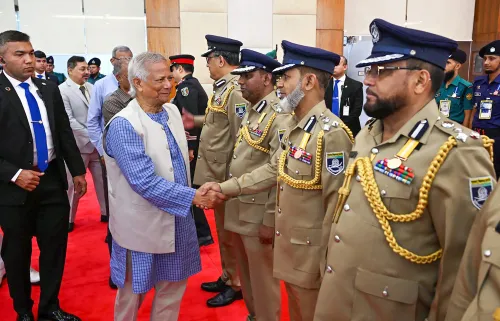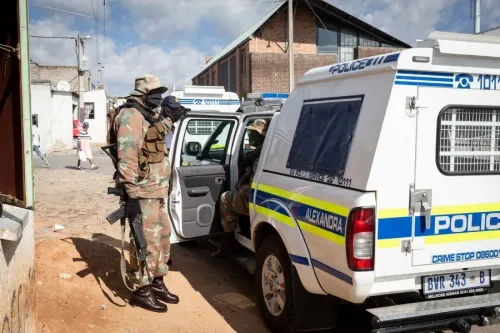How Did Pakistan Shift to Terror Funding via Cryptocurrency?

Synopsis
Key Takeaways
- Recent SIA raids reveal the use of cryptocurrency in terror financing.
- Anonymity in funding complicates tracking efforts.
- Traditional funding methods are being replaced by digital transactions.
- Agencies face challenges in adapting to new technology.
- Ongoing efforts are necessary to combat this evolving threat.
New Delhi, Aug 30 (NationPress) The recent operations executed by the Jammu and Kashmir Police’s State Investigation Agency (SIA) concerning terror financing through cryptocurrency have unveiled critical insights. These searches aimed to gather evidence of cross-border transactions utilizing cryptocurrency to finance terrorism in Jammu and Kashmir.
This incident marks the first documented use of cryptocurrency for funding terrorist activities in India.
The operations were fruitful, leading to the recovery of electronic devices by the SIA. This also revealed a covert financial network that was being exploited to support terrorism in Jammu and Kashmir.
According to the SIA, "These search operations signify the State Investigation Agency's steadfast commitment to uphold the nation's sovereignty and integrity while ensuring the safety and security of the residents of Jammu and Kashmir.”
This event indicates a significant transformation in the methods used to finance terrorism in India, particularly by Pakistan. Traditionally, funds for terrorist activities were gathered through illegal donations, narcotics trade, arms smuggling, and counterfeiting. Most of these funds reached terrorist organizations via hawala transactions.
The trend of using cryptocurrency for fundraising was initiated by Hamas in 2019. Following this revelation, the United States seized approximately 200 websites and 150 cryptocurrency accounts associated with Hamas.
The SIA's investigation suggests that Pakistan has established a framework that enables it to finance terrorist activities in India using cryptocurrency. This raises questions about what has changed in Pakistan's stance on digital currencies, which it previously viewed with suspicion.
Significant changes occurred after March 2025 when Pakistan established the Pakistan Crypto Council and appointed a Canadian-Chinese businessman as an adviser. Furthermore, an agreement was made with World Liberty Financial, a cryptocurrency firm linked to the family of former US President Donald Trump.
While it may appear that Pakistan aimed to attract investments and strengthen relations with President Trump, the concerning aspect for India is that this also provides Pakistan with a means to finance terrorism through cryptocurrency, allowing for anonymity in funding.
Previous funding methods allowed investigators to track financial trails. Many terrorist activities have been attributed to Pakistan because agencies could follow the money trail.
Choking funding is a vital component in the fight against terrorism. In the struggle against separatists in Jammu and Kashmir, one key factor leading to their decline was the disruption of their financial sources, which was possible due to the ability to track funding.
Currently, resources to combat this new method of funding are inadequate, and it may take time for agencies to gain control over it.
Pakistan has recognized these challenges and swiftly adapted to this new technology. This approach not only offers anonymity in funding but also circumvents financial trails. This signals a readiness on Pakistan's part to move away from traditional funding methods for terrorism and embrace new technologies that resemble legitimate transactions.
A report from the Financial Action Task Force (FATF) highlighted the exploitation of e-commerce platforms, social media, and online payment systems for financing terrorism.
"Today's report outlines current and evolving methods utilized by terrorist organizations and individuals to raise, transfer, store, and utilize funds and assets, including cash transportation, hawala, and other similar service providers, money value transfer services, online payment platforms, formal financial services, digital platforms (including social media such as Facebook, Telegram, and crowdfunding features), virtual assets, and the misuse of legal entities, such as shell companies, trusts, and non-profit organizations (NPOs)," the FATF stated.
The National Investigation Agency (NIA) identified the use of Chinese applications, cryptocurrency wallets, satellite phones, and the Darknet in terrorist activities. This was uncovered during investigations into incidents such as the Rameswaram Café blast (2024), the Pulwama attack (2019), Bihar-Nepal Fake Indian Currency seizures, and the Laos cyber slavery case.
"Tracing financial trails related to increasingly frequent ethnically, racially, or politically motivated terrorist attacks comes with its own set of challenges, including inconsistent designations and proscriptions, as well as low scale and visibility of financial activity in the preparation of attacks,” the FATF report noted.










